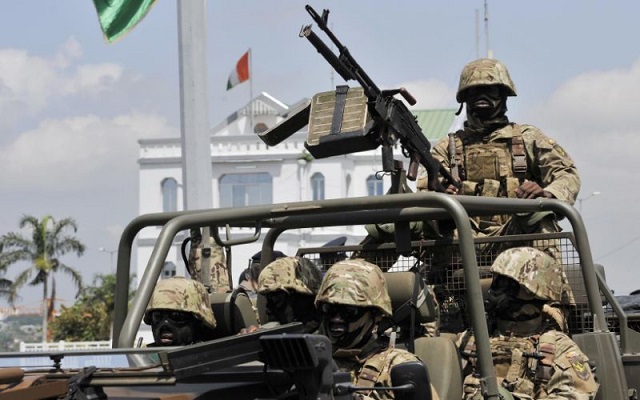
Bouaké, Ivory Coast | AFP | Heavy gunfire rang out Monday in Ivory Coast’s two biggest cities as a four-day mutiny by disgruntled soldiers spread nationwide but the government claimed a deal to end the crisis had been reached.
Banks, offices and department stores closed in the heart of the economic capital, Abidjan, as shots were fired in San Pedro, the second biggest port in the world’s top cocoa-producing nation.
Border posts closed, halting road traffic to Mali, Burkina Faso and Niger, while Ivory Coast’s second biggest city, Bouake, was under the control of mutinous soldiers.
The mutiny is the latest in a series of armed protests since January in the West African country, with troops angered by a wage dispute with President Alassane Ouattara’s government.
“This is not a coup. We want our bonuses. The president signed a paper saying he agreed with our bonuses. When he pays up, we’ll go home,” said a spokesman for troops at Bouake barracks, the centre of the latest protest.
“We’ll fight to the end. We won’t lay down arms,” he said, speaking on condition of anonymity from the city where the protest movement began earlier this year.
“8,500 of us brought Ouattara to power, we don’t want him to leave but he’s got to keep his word. It’s that simple,” he added as a group of soldiers, some wearing masks, let off shots.
– ‘Return to your barracks’ –
Defence Minister Alain-Richard Donwahi late Monday said “an agreement has been found” with the mutineers, though he did not give any details.
“We consequently call upon all soldiers to clear the entry points into cities and return to their barracks,” he said on national television.
But soldiers denied any deal had been reached.
“We do not recognise the agreement. How do you have a baptism without the baby? No representative from Bouake was there on Monday for their ‘deal’. As far as we know this was a meeting of high officials,” a mutineer said on condition of anonymity.
Heavily-armed rebel troops controlled exits and entrances to Bouake, where residents appeared to be largely staying indoors.
Ouattara took office in 2011 after months of deadly election violence in which more than 8,000 rebels supported him against troops backing ex-head-of-state Laurent Gbagbo, who refused to concede defeat at the ballot box.
Many of the rebels subsequently joined the regular army, which currently numbers some 22,000 troops.
Early on Monday, heavy gunfire was heard at two military camps in Akouedo in the east of Abidjan, that together form the country’s largest military barracks, a resident living nearby said.
Shots were also heard from Gallieni camp in the city centre.
Sustained gunfire rang out in Bouake, where one person died on Sunday from bullet wounds.
The situation was also tense in Man in the west and Bondoukou and Daloa in the centre of the country, where sporadic shooting could be heard.
The African Development Bank advised its employees in Abidjan to stay at home, warning that the security situation remained unclear.
– Falling cocoa prices –
Under a deal negotiated with the government in January following the initial protest, the ex-rebels were to be paid bonuses of 12 million CFA francs (18,000 euros) each.
They were given a partial payment of five million francs with the remainder to be paid starting this month, according to sources among the protesting soldiers.
But the government has struggled to pay the promised money.
Bouake served as the rebel headquarters following a failed coup in 2002 which split Ivory Coast in half and led to years of unrest.
The former star French colony has since been slowly regaining its credentials as a West African powerhouse and a haven of peace and prosperity.
But falling cocoa prices have hobbled the government’s finances.
The current round of trouble began late Thursday when a soldier presented as a spokesman for the former rebels said they wished to apologise to Ouattara for the January mutiny and were renouncing their demand for huge payouts.
But the “apology”, which was delivered in a televised ceremony, was viewed with scepticism by many of the mutinous soldiers.
Last year, the government unveiled a plan to modernise the military, part of which would involve the departure of several thousand men, mainly ex-rebels, who will not be replaced.
 The Independent Uganda: You get the Truth we Pay the Price
The Independent Uganda: You get the Truth we Pay the Price





